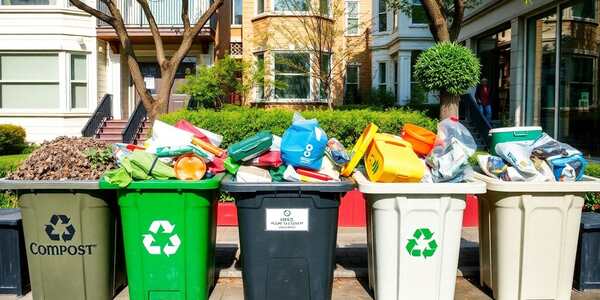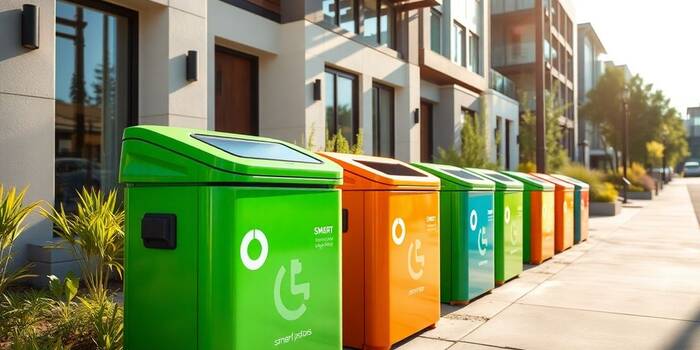The Importance of Smart Waste Solutions
Why should anyone care about smart waste solutions? Well, think about it. We’re producing more waste than ever, and traditional methods just aren’t cutting it anymore. It’s time to get smarter about how we handle our trash.
Smart waste solutions aren’t just about being trendy; they’re about creating a more sustainable future. It’s about reducing landfill waste, conserving resources, and minimizing our environmental impact. Plus, it can save money in the long run.
Smart tech can help us manage waste better. It’s a win-win for everyone involved. Let’s explore how these solutions can make a real difference.
Types of Waste Generated by Homes and Businesses

Residential Waste: Common Types and Challenges
Residential waste is pretty varied. Think about what you toss each week. It’s usually a mix of stuff.
Common culprits include food scraps, paper, plastics, and yard waste. Managing this waste effectively can be tough. Space is often limited, and knowing what to recycle isn’t always clear.
This leads to overflowing bins and missed recycling opportunities.
Business Waste: Unique Considerations and Regulations
Business waste differs quite a bit. It depends on the type of business, of course. A restaurant’s waste looks way different than an office’s.
Restaurants deal with lots of food waste and packaging. Offices generate paper, e-waste, and other recyclables. Businesses also have to follow specific regulations.
These rules cover things like hazardous waste disposal and recycling mandates. Staying compliant can be a real headache.
Innovative Waste Solutions for Residential Areas
Recycling Programs and Initiatives
Recycling is a cornerstone of residential and business waste solutions in the Bay Area. Many communities offer robust recycling programs. These programs often include curbside pickup of recyclables.
Effective programs provide clear guidelines. Residents need to know what materials are accepted. This helps reduce contamination and improves recycling rates.
Some areas are exploring advanced recycling technologies. These technologies can process a wider range of materials. This could further reduce landfill waste.
Composting: A Sustainable Option for Households
Composting turns food scraps and yard waste into a valuable soil amendment. It’s a great way to reduce residential and business waste solutions in the Bay Area. Many households are embracing composting.
Backyard composting is a simple option for homeowners. There are also community composting programs available. These programs provide resources and support for residents.
Composting not only reduces waste but also enriches the soil. It’s a win-win for the environment and your garden.
Composting is a great way to reduce the amount of waste that goes to landfills. It also helps to improve the quality of the soil. This is a great way to help the environment and your garden. Composting is a great way to reduce the amount of waste that goes to landfills. It also helps to improve the quality of the soil. This is a great way to help the environment and your garden.
Business Waste Solutions: Best Practices
Implementing a Waste Reduction Strategy
Businesses can make a real difference with a solid waste reduction plan. It starts with understanding what kind of waste is being produced. Then, businesses can look at ways to cut back on the amount of waste they generate in the first place.
Simple changes can have a big impact. Think about using less packaging, switching to reusable containers, and going paperless whenever possible. These steps not only help the environment but can also save money.
A good strategy involves setting clear goals and tracking progress. Regular audits can help identify areas for improvement. This ensures the business stays on track with its waste reduction targets.
Partnering with Local Waste Management Services
Choosing the right waste management partner is key for businesses. Local services often have a better understanding of local regulations and recycling options. They can provide tailored solutions that fit a business’s specific needs.
These partnerships can go beyond just picking up trash. Many services offer consulting to help businesses improve their waste management practices. This can include advice on sorting, recycling, and composting.
Working with a local service can also boost a business’s reputation. Customers often appreciate companies that are committed to sustainability. This can lead to increased customer loyalty and positive word-of-mouth.
The Role of Technology in Waste Management
Technology is changing waste management. It’s not just about trucks anymore. Think sensors, data, and smart systems.
These advancements aim to make things more efficient. The goal is to reduce waste and improve recycling rates.
It’s about using data to make better decisions. This helps create a more sustainable future.
Recycling Programs and Initiatives
Tech helps recycling in a big way. Smart bins can tell when they’re full. This avoids unnecessary trips.
Optical scanners sort materials faster. This reduces contamination and improves the quality of recycled goods.
Apps educate people on what to recycle. This increases participation and reduces waste.
Composting: A Sustainable Option for Households
Technology is making composting easier. Sensors monitor compost conditions. This ensures optimal decomposition.
Apps provide guidance on what to compost. This helps people avoid mistakes and maximize their efforts.
Smart scales track compost volume. This gives households feedback on their progress and impact.
Implementing a Waste Reduction Strategy
Data analysis is key to waste reduction. It identifies sources of waste. This helps businesses target their efforts.
Software tracks waste generation. This allows businesses to monitor their progress and make adjustments.
Employee training programs use technology. This educates staff on waste reduction strategies.
Partnering with Local Waste Management Services
Technology improves communication with waste services. Businesses can request pickups online. This streamlines the process.
GPS tracking monitors waste collection routes. This ensures efficient and timely service.
Online portals provide data on waste disposal. This helps businesses track their environmental impact.
Wrapping Up Smart Waste Solutions
In conclusion, smart waste solutions are reshaping how we handle trash in the Bay Area. With technology like smart bins and AI-driven systems, both homes and businesses can manage waste more efficiently. These innovations not only help reduce landfill waste but also promote recycling and sustainability. As we move forward, it’s clear that engaging the community and educating residents will be key to making these systems work. The future of waste management looks promising, and by embracing these smart solutions, we can all contribute to a cleaner, greener Bay Area.
In the Bay Area, managing waste efficiently is crucial for both homes and businesses striving for sustainability. One effective solution is utilizing affordable dumpster rentals for local businesses, which not only streamlines waste disposal but also supports eco-friendly practices. These rentals offer flexibility and convenience, allowing businesses to handle large volumes of waste without the hassle of frequent pickups. By integrating such smart waste solutions, companies can reduce their environmental footprint while maintaining a clean and organized workspace. This approach not only benefits the environment but also enhances operational efficiency, making it a win-win for businesses committed to sustainable practices.
In the quest for efficient waste management, both residential and commercial entities are increasingly turning to innovative solutions. For those in the Bay Area, smart waste systems are revolutionizing how waste is handled, reducing environmental impact and improving operational efficiency. Meanwhile, for businesses and homeowners on the East Coast, particularly in Massachusetts, there are convenient options like dumpsters for rent in Boston. These services provide flexible and reliable waste disposal solutions, ensuring that waste is managed responsibly and sustainably. By integrating such services, communities can significantly enhance their waste management practices, contributing to a cleaner and more sustainable environment.


